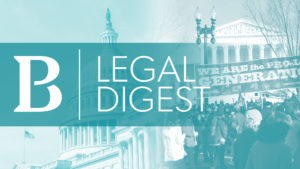
EDITOR’S NOTE: This article first appeared in National Review, online at www.nationalreview.com. Used by permission.
WASHINGTON (BP) — The cascading crisis involving derogatory depictions of Islam’s prophet Muhammad by amateur American filmmakers and French satirists has reinvigorated a 20-year-old demand from the Muslim world for a Western crackdown on free speech.
This demand has been made by Egypt’s Salafist Nour party, by Iran’s theocrats, by Hezbollah and, not least, by the al-Qaeda-linked groups that on Sept. 11 and the days immediately following attacked and rioted against our embassies and interests in two dozen Muslim countries, killing Ambassador Chris Stevens and 51 others and injuring hundreds. It is also being pressed on the diplomatic front by Muslim governments allied to the U.S.
Without doubt, the uproar over the 12-minute video “Innocence of Muslims” is the result of ulterior motives and political manipulations as Islamists jockey for power. Nevertheless, and not for the first time, large populations have been incited to violence by these cynical and opportunistic forces. It is important to respond in a principled and coherent way.
The Islamist demand for a global curb to free speech first burst upon the scene in 1989 when Salman Rushdie was condemned to death by Iran’s Ayatollah Khomeini (whose fatwa was bolstered with a decidedly worldly bounty, recently increased by $500,000, to $3.3 million). Its most recent diplomatic articulation came on Sept. 20, from Ekmeleddin Ihsanoglu, the Turkish secretary general of the Organization of Islamic Cooperation (OIC), a Saudi-based group of 56 member states. Calling for “an international code of conduct for media and social media to disallow the dissemination of incitement material,” Ihsanoglu said the international community should “come out of hiding from behind the excuse of freedom of expression.”
The United States has never offered a sustained defense of free expression in response to such demands, and has even signaled to the Muslim world that it is willing to restrict speech. Under the Clinton administration, the U.S. joined the OIC in a non-binding U.N. resolution calling for a universal ban on the “defamation of religion.” The Bush administration broke that consensus but made no attempt to lobby against the resolution, which the U.N. continued to adopt annually for a decade. Nor did it try to explain the importance of individual freedoms of speech and religion when they were under assault during worldwide Muslim rioting — in 2005 against Danish cartoons depicting Mohammed and in 2006 against Pope Benedict’s Regensburg speech, which included a quote linking Islam to violence.
The Obama administration has at times acclaimed free speech, as President Obama did in his recent address to the U.N. General Assembly, but it has also joined in U.N. calls for religious-hate-speech codes and left the impression that the First Amendment is out of step with international human-rights standards. In his 2009 Cairo speech, President Obama pledged to fight anti-Islamic “stereotyping,” and in 2011 Secretary of State Hillary Clinton followed up on this promise with her proposal for a series of conferences with the OIC to develop “implementation” measures for this fight.
Last month, the administration (unsuccessfully) asked Google to remove the Muhammad video from YouTube, which Google owns, and dispatched the FBI to investigate whether the video’s principal maker could be arrested on a technicality. It also, and not for the first time, deployed top military brass to personally try to silence micro-church pastor Terry Jones, who had praised the video. On the anniversary of 9/11, four hours before the violence erupted, the U.S. embassy in Cairo posted on its website a statement echoing the OIC and suggesting that by hurting Muslims’ “religious feelings” the video was an “abuse [of] the universal right to free speech.”
We need to take stock of what is really being asked of us. It is not a small thing. This is not about offending people. The Saudi ministry of education has no compunction about teaching that Jews are “apes” and Christians are “pigs.” Egypt’s law banning “insult to heavenly religions” does not stop Egyptian state media from denigrating Coptic Christians and promoting “The Protocols of the Elders of Zion” [a discredited anti-Semitic booklet]. This is not even about offensive speech concerning Muslims. As Mohammed Bouyeri told a Dutch court during his trial for the murder of filmmaker Theo Van Gogh: “The story that I felt insulted as a Moroccan, or because he called me a goat-[expletive], that is all nonsense. I acted out of faith.” In other words, he acted because he thought Islam was blasphemed when Van Gogh’s film criticized the Quran’s verses on women. Or, as Egypt’s Grand Mufti Ali Gomaa put it in a Washington Post article about the recent YouTube video: “Insults against the Prophet are taken as more serious than insults against one’s own parents and family, indeed than one’s own self.”
Whether the putative offense is called religious “defamation,” “insult” or “incitement,” the goal of the OIC and many Muslims is to universalize Muslim blasphemy codes. They will not be placated by hate-speech laws of the kind mandated within the European Union following the Danish cartoon crisis — laws that protect Muslims, but not Islam per se, from insult. Nor would simple bans against Quran-burning of the sort Sen. Lindsey Graham, R.-S.C., proposed last year settle the matter.
What is being demanded is sweeping censorship, covering all that has been asserted as truth in the Quran, in thousands of other Islamic texts called “hadiths,” and in other Islamic sources over 1,300 years.
Most Muslim countries have such laws, but their application varies over time and from place to place. Traditional punishments for blasphemy include the death penalty, which is still applied by Iran and Pakistan. Frequently, it is dissidents and religious minorities who are targeted for prosecution. Where control is loose, the accused, even if acquitted, are also vulnerable to attacks by vigilantes who often operate with impunity. For example, no one has been arrested for the March 2011 murder of Pakistani cabinet minister Shahbaz Bhatti, who had criticized Islamic blasphemy laws.
The Internet and social media have the potential to give these codes unlimited reach: Muslim reformers cannot escape being attacked even in exile. In 2006, a group called Al-Munasirun li Rasul al Allah — previously unknown, and now thought to be based in Egypt — used e-mail to threaten more than 30 prominent Muslim reformers in the West. Among the targets were renowned Egyptian human rights advocate Saad Eddin Ibrahim and Sheikh Subhy Mansour, an imam who was imprisoned and had to flee Egypt after opposing the death penalty as a punishment for apostasy. They were pronounced “guilty of apostasy, unbelief, and denial of the Islamic established facts” and given three days to “announce their repentance” or be killed. The e-mail included their addresses and the names of their spouses and children.
The new media also provide new outlets for people to commit blasphemy, including people who live in the Muslim world. The first blogger convicted for blasphemy was Egyptian Kareem Amer, a Muslim who was sentenced in February 2007 to three years of imprisonment for insulting Islam. His offense was to criticize the treatment of Copts.
With the Arab Spring, blasphemy on social media has proliferated. Even as rioters raged outside our embassy in Egypt, an Egyptian court was handing down a three-year prison sentence to Coptic Christian Bishoy Kamel, a teacher from the city of Sohag, for posting cartoons deemed insulting toward Muhammad on his Facebook page (he was given an additional three years for insulting Egyptian president Mohamed Morsi and an Egyptian prosecutor). At the same time, Albert Saber, a 25-year-old Egyptian Coptic activist, was arrested and reportedly tortured for insulting religion after allegedly posting on his Facebook page the anti-Muhammad YouTube trailer. And Gamal Abdou Massoud, a 17-year-old Copt from the city of Asyut, is serving a three-year sentence imposed last May for insulting Islam when he posted cartoons lampooning Muhammad on Facebook. In response, outraged local Muslims had rioted with impunity in Asyut, burning homes and injuring several Christians.
In 2011, Naguib Sawiris, the Coptic founder of a liberal party and one of Egypt’s richest men, was accused by Islamist lawyers of offending Islam; charges were eventually dismissed on procedural grounds. He had tweeted a cartoon of Mickey and Minnie Mouse dressed in conservative Islamic garb. Hamza Kashgari, a Saudi columnist whose tweets of an imaginary conversation expressing religious doubt to Islam’s prophet prompted an Internet petition calling for his death, was arrested last February in Malaysia. He was extradited to Saudi Arabia and placed in solitary confinement in a Riyadh prison, and his fate is unknown. In June, a Turkish court charged Fazil Say, a composer and concert pianist, for a single tweet poking fun at a literal conception of paradise.
Pakistan, with its strict blasphemy laws, has struggled to censor its tech-savvy population. Overwhelmed by the sheer number of cases, as well as the accompanying rioting, the government has turned to temporary blanket bans on the offending media. Last May, Pakistan blocked Twitter for a day, accusing it of promoting a “blasphemous” cartoon contest on Facebook. The Pakistan Telecommunication Authority reportedly then engaged in talks with Twitter to remove all “objectionable” content. Pakistan banned Facebook for two weeks in 2010 for a similar cartoon contest; at the same time it banned YouTube and hundreds of other websites and services. Last month, Pakistan succeeded in having Google block access within its borders to Innocence of Muslims. Nevertheless, riots led by Pakistan’s Jamaat-e-Islami and al-Qaeda-linked groups against American interests escalated, prompting the U.S. to run TV ads on seven channels with President Obama, Secretary Clinton and ordinary Americans denouncing the video. The riots also prompted Islamabad to jam cell phone service in 15 major cities, affecting millions.
There can be little doubt: To comply with Muslim blasphemy laws would be to undermine our democracy, the rule of law, the free exchange of ideas and our way of life. The West once privileged Christianity in this way and the ensuing religious wars and political oppression led America’s founders to enact the First Amendment.
A serious and respectful American policy response to the Muslim demand for Western blasphemy bans is long overdue. President Obama’s U.N. speech was only that: a single speech. It was unsupported by his specific foreign policies. His adminstration has failed to lead a diplomatic effort among our Western allies to rally support for the rights of the individual to freedom of speech and religion, and has neglected to stand up for such freedoms in its overall foreign policy. We should lead a sustained conversation articulating the importance of individual freedoms of speech and religion to democracy and to economic advancement, personal as well as societal.
We should firmly assert that we do not — and will not — regulate speech on behalf of any religion or body of ideas. We should appeal for the freedom of specific blasphemy prisoners abroad and expose the injustices and due process lapses surrounding their cases. We should defend the religious minorities that are oppressed in — and in danger of being driven from — Iraq, Syria, Egypt, Pakistan, Iran, Saudi Arabia, Mali and parts of Nigeria. We should tell our allies among the OIC member states to end the stoking of outrage over blasphemy, including by the imams they appoint, register and fund.
And we should cite the words of courageous Muslim reformers themselves. One is the late Naser Abu-Zayd, who was driven out of his native Egypt for expressing such thoughts as this: “Charges of apostasy and blasphemy are key weapons in the fundamentalists’ arsenal, strategically employed to prevent reform of Muslim societies and instead confine the world’s Muslim population to a bleak, colorless prison of sociocultural and political conformity.”
–30–
Reprinted by permission from National Review, online at www.nationalreview.com. Nina Shea is director of the Hudson Institute’s Center for Religious Freedom and a former member of the U.S. Commission on International Religious Freedom. Shea and Paul Marshall are the authors of “Silenced: How Apostasy and Blasphemy Codes Are Choking Freedoms Worldwide” (Oxford University Press, 2011).















